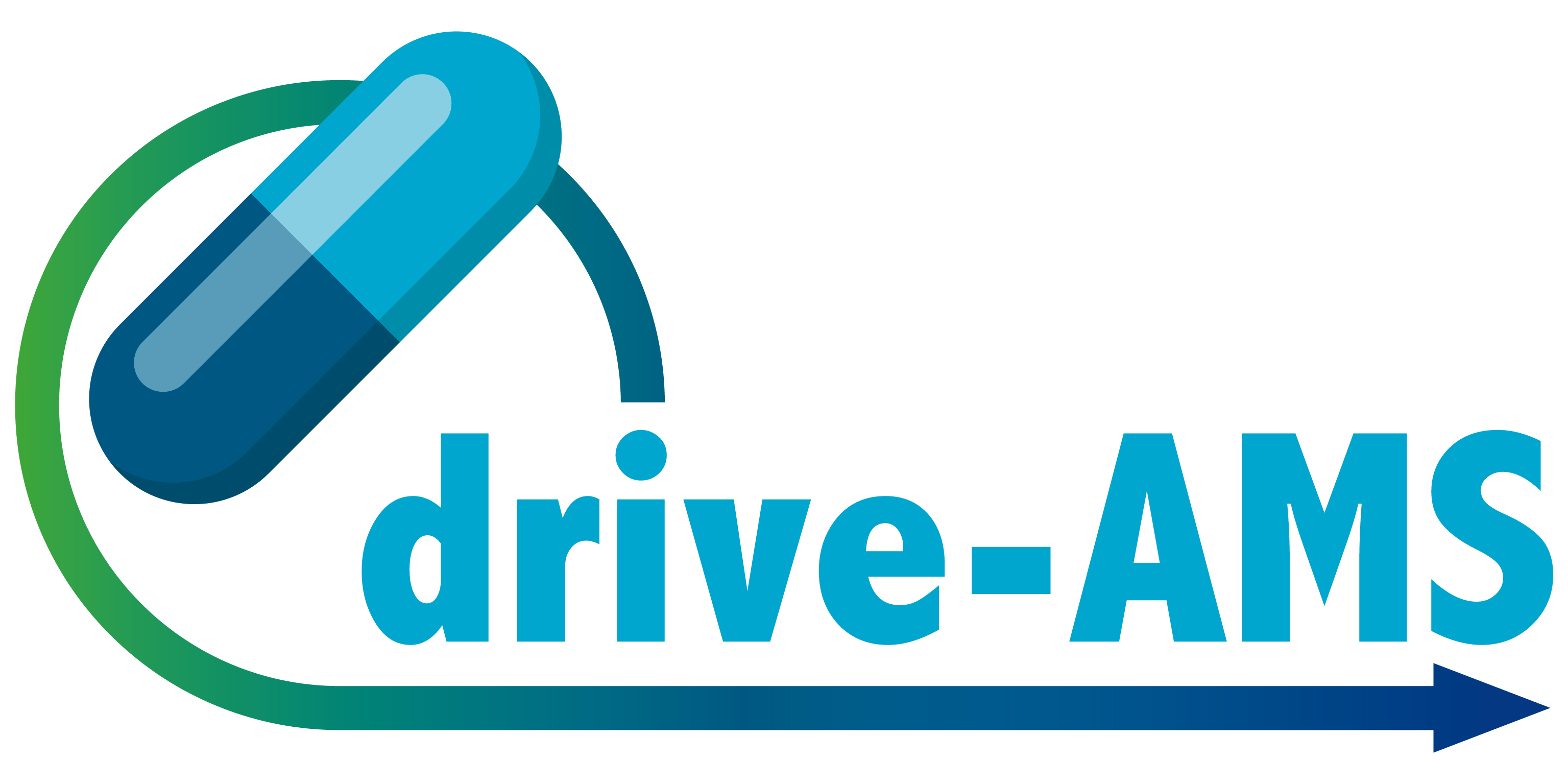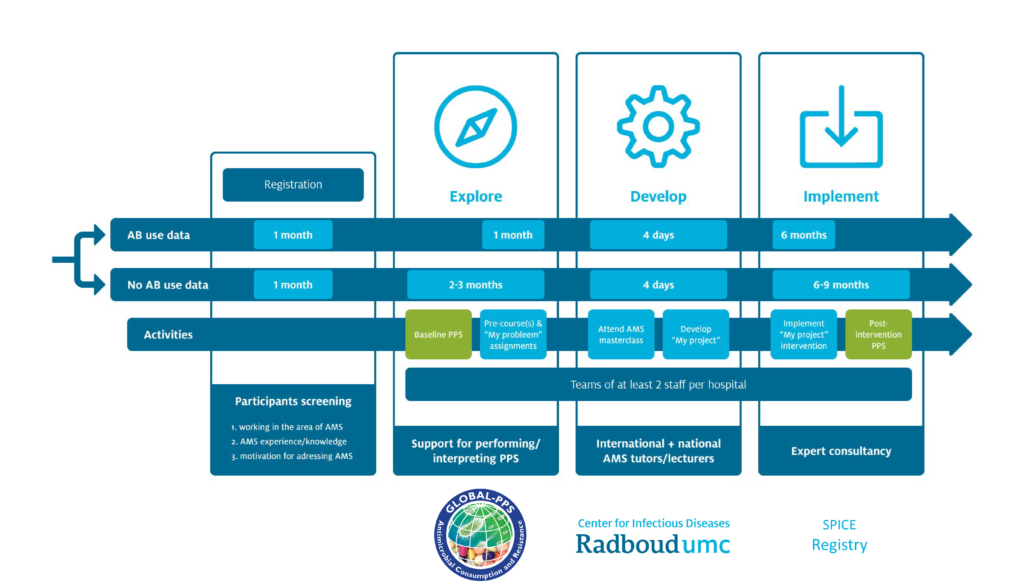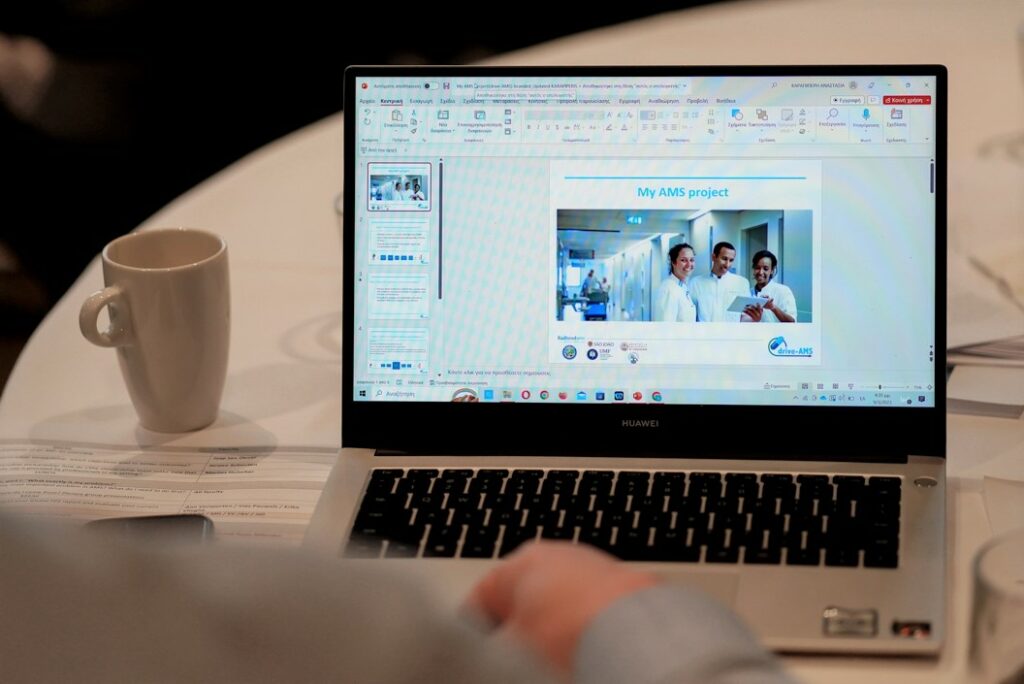ABOUT drive-AMS
drive-AMS in a nutshell
drive-AMS is an initiative for a data-driven implementation of a step-wise behavioural change approach and expert consultancy for a more appropriate use of antimicrobials. The project supports an effective implementation of Antimicrobial Stewardship (AMS) interventions in European healthcare facilities through a powerful synergy between Radboudumc and the University of Antwerp’s Global-PPS. Radboudumc offers comprehensive expertise in effective and sustainable AMS program training for healthcare professionals. The Global-PPS provides a tool to measure and monitor antimicrobial prescribing and healthcare-associated infections, while identifying targets for achievable AMS interventions.
Background
Key components
Key objectives
Background
AMR
Effective response to antimicrobial resistance (AMR) entails prudent antimicrobial use and improvement of surveillance, which are both key strategic priorities of the EU One Health Action Plan on AMR, suggesting antimicrobial stewardship programmes (ASP) need to be strengthened across the Union. Sustainable AMS programmes have 3 core components:
- system prerequisites (BASICs, including measurement);
- WHAT the AMS team wants to improve; and finally,
- HOW the AMS team will achieve these goals.
In existing training programmes, a lot of emphasis is placed on the ‘WHAT’ of AMS, and little attention is generally paid on the ‘HOW’ within an ASP: HOW to make sure that professionals comply to these ‘WHAT’ recommendations. This usually requires a behaviour change approach.
The Dutch Antimicrobial Stewardship Masterclass
Based on this philosophy, in 2018, Radboudumc developed the Dutch Antimicrobial Stewardship, Masterclass & Expert consultancy programme, providing guidance for professionals and policy makers through the process of developing and implementing a successful Antimicrobial Stewardship Program in healthcare facilities. To date, this program was delivered to over 300 participants in over 20 countries. Find out more about the programme here.
Global-PPS
To achieve full effectiveness, the approach is expanded with data-driven component, using available tools, such as Global-PPS. In 2014, the Global Point Prevalence Survey of Antimicrobial Consumption and Resistance (Global-PPS), was developed by the Laboratory of Medical Microbiology of the University of Antwerp, to provide a standardised, feasible and freely available web-based surveillance tool for measuring the quality of antimicrobial prescribing practice in hospitals worldwide. The Global-PPS is a well-developed and standardized method for assessing antimicrobial prescribing practices, the burden of HAI and resistance. To date the Global-PPS has been used in 29 countries by more than 290 hospitals in the WHO European region.
These two complementary programmes have now joined forces in the drive-AMS project. The project combines three key elements: knowledge transfer, measurement, and expert consultation.
Our key components
drive-AMS project will: build capacity of national experts; deliver national DRIVE-AMS courses; provide expert support for My Project implementation.
To enable access to drive-AMS in the rest of Europe, we foresee: continuation of National drive-AMS courses, extending capacity to other EU countries, continuing Global-PPS support, sustaining expert support to EU countries and extending it to non-EU countries.
The learning objectives of the Radboudumc AMS Masterclass & expert consultancy include:
- understand the problems of AMR across global, national and local levels;
- understand and be able to describe the core elements of antimicrobial stewardship;
- understand how to develop local/national guidelines for appropriate antibiotic use, based on international guidelines and local/national resistance levels;
- be aware of the main barriers to the development of an Antimicrobial Stewardship Program, and be able to apply improvement strategies to address these;
- be able to convey the knowledge and skills needed for Antimicrobial Stewardship to both clinical and management teams in hospitals;
- define next steps to take to improve antibiotic use/implement antibiotic stewardship in my health care setting/country.
Find out more about the course here.
The Global-PPS provides a tool to:
- evaluate antimicrobial prescribing practices and survey performance indicators in hospitals (identify burden),
- help designing hospital interventions and identifying targets for quality improvement of antimicrobial prescribing and the prevention of Healthcare-Associated Infections (HAI) (change practice),
- assess the effectiveness of the interventions through repeated PPSs (measure impact).
Find out more about the tool here.
Our key objectives
The general objective of the drive-AMS project is to reduce inappropriate antimicrobial use resulting in antimicrobial resistance (AMR) in healthcare (hospital and long-term care) facilities through supporting effective implementation of Antimicrobial Stewardship (AMS) interventions using a step-wise behavioural change approach. This objective will contribute to the European and national targets for reducing inappropriate antimicrobial use and tackling AMR.
The specific objectives are:
- Build capacity for AMS implementation by training national experts (Train-the-trainer approach) using the AMS behavioural approach and establishing four national hubs for capacity building in AMS, resulting in at least 30 trained national trainers.
- Enable regular performance of Global-PPS at facility level, to inform AMS teams on the prevalence and quality of antimicrobial prescribing, driving development of targeted AMS interventions; provide specific skills for conducting and analysing a PPS, in at least 64 facilities.
- Provide training and expert consultancy based on the Global-PPS real-time feedback reporting and the drive-AMS course, tailor-made to country-specific health systems and context to at least 256 persons in 64 facilities.
- Empower professionals, by establishing a European registry for expert consultancy and an AMS Alumni Support Network for continuous support between healthcare facilities and cross-collaboration of countries, with over 300 professionals from at least 20 EU member states.


